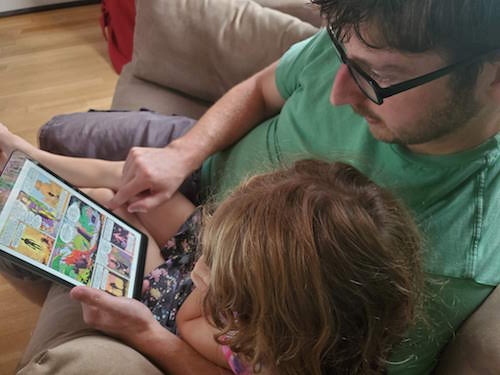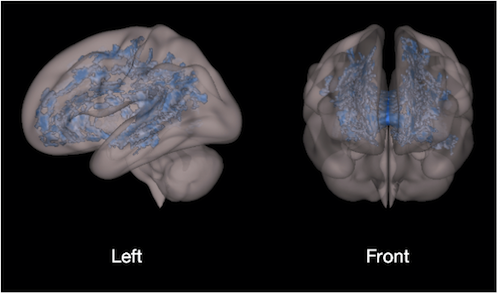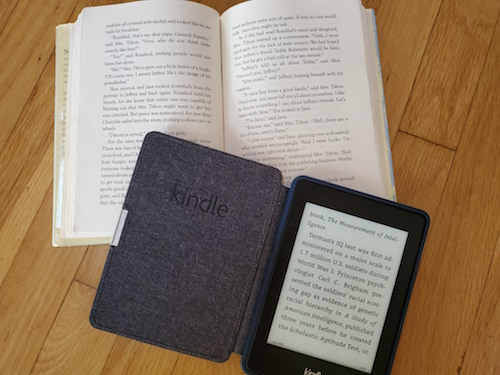
Are Ebooks as Beneficial as Paper Books?
We all know how wonderful and beneficial it is to snuggle up with your child and read a good book. For many families, there will never be a replacement for sharing physical books. But in recent years – and especially recent months – we’ve seen a huge surge in ebook circulation as many families are finding their e-readers just as snuggly as a good old fashioned paperback.
Reading with your child in nearly any capacity improves their literacy development, but it is so much more effective when they feel loved and are bonding with you at the same time. To achieve this, think about reading as a triangular interaction that’s made up of the child, the loving engaged adult, and the reading material.
Can this reading triangle and literacy development still happen using electronic materials?

In recent years, scientists have set out to answer this question. A 2019 study in JAMA Pediatrics explored how both reading and screen time affect the organization of the developing brain. They examined both the screen time and reading habits of a group of 3-5 year olds and found that increases in screen time directly correlated with “lower structural integrity” in the part of the brain that’s responsible for language skills and literacy. At the same time, they found that children who have a “nurturing home literacy environment” had better development in that part of the brain. The authors of this study specifically mention that the results of their study are “especially complicated because [screen time] encompasses a large variety of experiences” with varying levels of adult interaction. But a reasonable conclusion would be that technology needs to be used along with adult interaction to improve a child’s home literacy environment rather than as a replacement for it.

Does the brain react differently when reading on paper versus reading on a screen? Studies throughout the 1980’s found that human brains retained less information and could not comprehend as well when reading text on screens. However, beginning in the 1990’s, study results began to shift and reading results began to equalize. Studies whose results found readers were equally as successful in both mediums became nearly as common as studies that didn’t. In a 2013 article in Scientific American, Ferris Jabr pondered “Perhaps, then, any discrepancies in reading comprehension between paper and screens will shrink as people’s attitudes continue to change… Perhaps [young people] will grow up without the subtle bias against screens that seems to lurk in the minds of older generations.”
If you endeavor to read ebooks with your children, think about the differences in the types of screen time they are experiencing. Many ebooks, especially on older ereaders, behave just like physical books. These still require an adult to read the screen’s contents to the child, encouraging human interaction.
Other ebooks and devices have additional features that will read the book out loud by itself. They also often have music and games embedded in the book. These can distract from actual reading and can reduce the input needed by that loving adult that completes the all-important reading triangle. These bonus features are not bad, but they are not reading. If your child is using these features, you should think of it more as screen time than reading time.
So read ebooks with your children! Adding ebooks to your repertoire will exponentially expand the quantity and variety of books available to you and your family! Just remember to treat the ebook like a book, not a game. The adult should lead the interaction rather than letting the device do the work.

If you and your child are sharing an ebook together, you can utilize it just like a paper book to create an engaging interactive triangle between you, your child, and what you are reading together.
For further research:
Early Childhood Investigations Webinars. “The Magic Triangle of Reading Aloud: The Book, the Child, and the Adult”, by Isabel Baker, M.A.T., M.L.S. and Amy E. Vandament. Accessed 17 July 2020.
Hou, Chia-Yi. “Surprising brain scans show what reading and screen time can do to the brain.” The Hill. 17 Jan. 2020. Accessed 17 July 2020.
Jabr, Ferris. “The Reading Brain in the Digital Age: The Science of Paper versus Screens.” Scientific American. 11 Apr. 2013. Accessed 17 July 2020.
Reading Rockets. “How to Read an E-Book with Your Child.” Colorin Colorado. . Accessed 17 July 2020.
Wolf, Maryanne. “Screen Time Is Changing Our Brain Circuitry.” Medium. 8 Aug. 2018. . Accessed 17 July 2020. Excerpt from: Wolf, Maryanne. Reader, Come Home: The Reading Brain in a Digital World. HarperCollins Publishers. 2018.